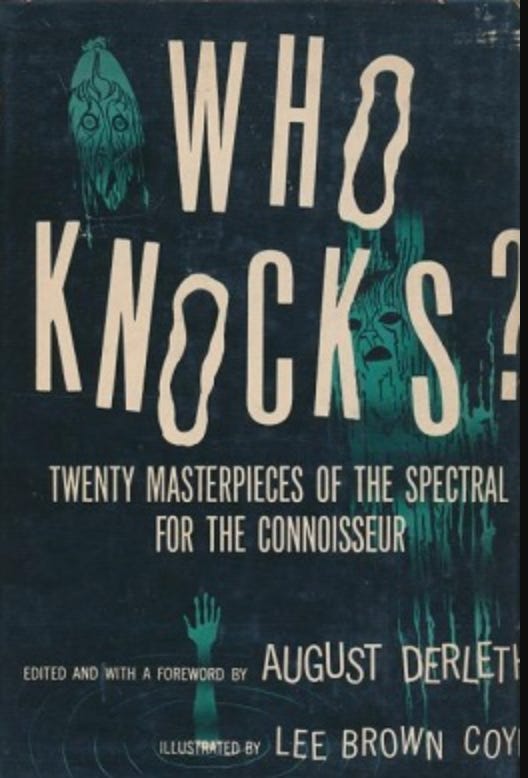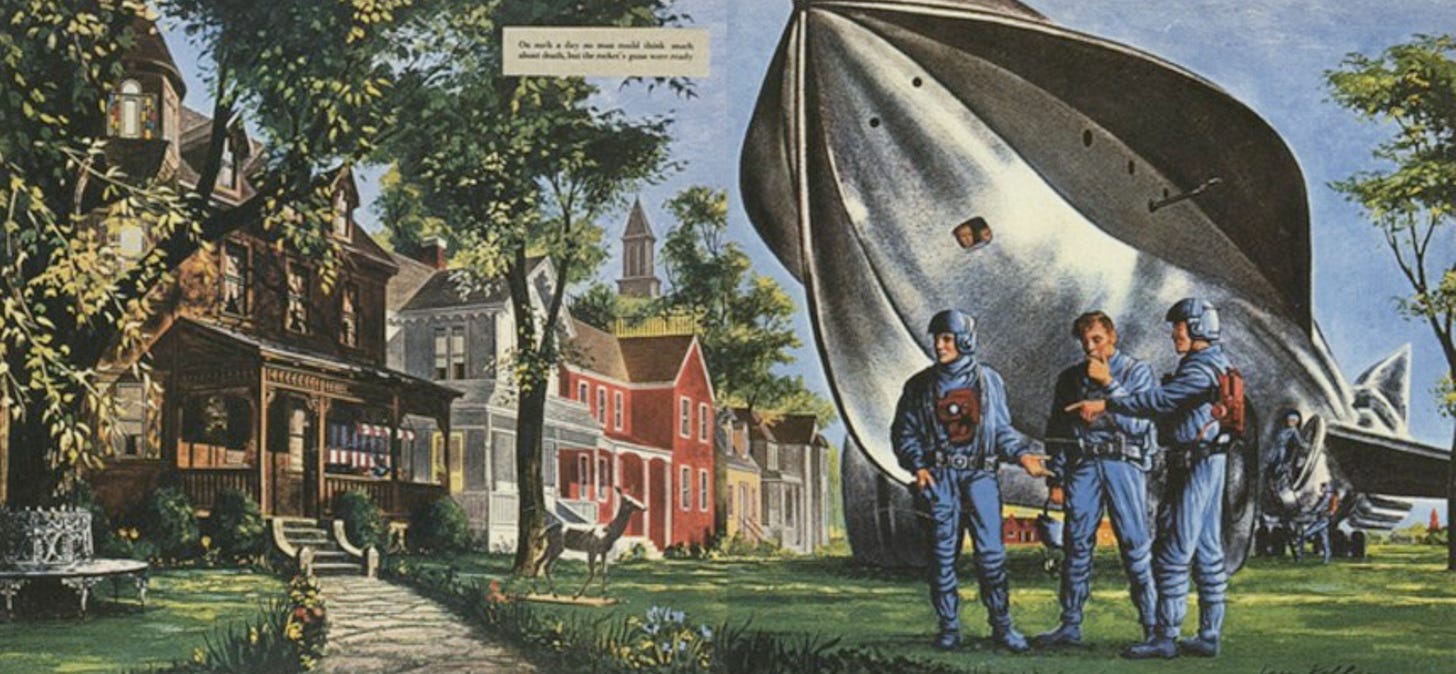I recently wrote a short piece about Ray Harryhausen here on The Obelisk, and I was delighted to discover that he had been a very close friend of Ray Bradbury. It was somehow heart-warming to imagine the two Rays, both greats of the imaginative realms of film and fiction, meeting in Harryhausen’s workshop, smoking a cigar and sharing a companionable glass of Scotch whilst playing with flexible model dinosaurs. Indeed, Bradbury said about their friendship:
“We promised to grow old together but never to grow up.”
Both friends made their career ‘breakthrough’ at around the same time in the late 1940s and early 1950s. But prior to this, Bradbury was a regular contributor to the pulps with some of his early short stories later published by August Derleth's Arkham House press. In one 1946 collection, Who Knocks? Bradbury’s short story The Lake was published alongside the works of Lovecraft and others.
Ray Bradbury (1920-2012) was born and grew up in the small Illinois community of Waukegan, and his childhood was both contented and influential on his later writing. Bradbury often reminisced about his early love of horror films, citing The Hunchback of Notre Dame (1923) as a seminal experience as a child (he was so impressed by Lon Chaney’s portrayal of Quasimodo that he wanted to grow up to be a hunchback).
But cinema aside, Bradbury was an unapologetic bibliophile. In both taped interviews, and in ink, throughout his career, Bradbury would regularly eulogize about the importance of libraries in opening a world of imagination through literary adventure. As a child he had explored for himself many realms of the fantastic plucked from the library shelf, ranging from L. Frank Baum’s Oz series, to the yarns of Edgar Rice Burroughs.
“Burroughs is probably the most influential writer in the entire history of the world. By giving romance and adventure to a whole generation of boys, Burroughs caused them to go out and decide to become special.” RB
The Bradbury family moved west to California in 1934 and by 1937 the teenage Bradbury had joined the Los Angeles Science Fiction League (LASFL). In this circle (that met weekly), he was surrounded by other youthful enthusiasts of speculative realms and encouraged by writers such as Henry Kuttner and Robert Heinlein.
The rest, as they say, is history. Many of Bradbury’s early stories were published in Weird Tales. By the time his first book of short stories was published (Dark Carnival in 1947), he had a growing archive of weird and wonderful stories.
Bradbury’s star continued to rise. The Martian Chronicles published in 1950, explores humanity’s colonization of the red planet. Mankind faces the Nietzschean challenge of ‘overcoming’ whilst pursuing the manifest destiny of man to conquer the stars. And Bradbury himself was explicit in his enthusiasm for space exploration. With the publication of The Martian Chronicles, his own literary ascent was assured.
There is an interesting anecdote about the book’s genesis. Bradbury had been on a visit to New York peddling his wares with various publishers and boarding at the YMCA for 50 cents a night. His wife was pregnant and he needed a break, but each publisher was insistent that they wanted novels, not short stories. However, on the final night before returning home, the last publisher he saw said, “I think you’ve written a book, but you don’t know it... What about all those Martian stories you’ve been writing in the pulp magazines... What if you tied all these stories together in a tapestry? Wouldn’t they make a book called The Martian Chronicles?”
Bradbury agreed. He returned home to LA with a double publishing payout. $700 for The Martian Chronicles and another $700 for The Illustrated Man.
But Bradbury was firm about his contributions to the genre: “... Martian Chronicles is not science fiction, it's fantasy. It couldn't happen, you see? That's the reason it's going to be around a long time—because it's a Greek myth, and myths have staying power.”
It was, however, what could be considered a Sci-Fi novel that cemented Bradbury’s reputation and one that is still regarded as perhaps his finest work. Fahrenheit 451 (1953) is set in a dystopian future where books are forbidden. Guy Montag is a ‘fireman’ whose job it is to burn books. But he surreptitiously saves a book and discovers the magic of reading.
“You don't have to burn books to destroy a culture. Just get people to stop reading them.” RB
In 1954 Bradbury was hired as a screenwriter by film director John Huston, spending six months in Ireland whilst working on the screenplay for the film Moby Dick (1956). The success of Houston’s movie ensured that Bradbury became a popular screenwriter in Hollywood. He would go on to write scripts for, amongst other things, Alfred Hitchcock Presents, and The Twilight Zone.
It is the combination of a sweeping imagination, in taut harmony with a poet’s voice, that makes up the Bradbury style. Suffused with metaphor, his writing is also objective in its tone, it is convincing no matter how strange the subject.
“The rockets came like locusts, swarming and settling in blooms of rosy smoke. And from the rockets ran men with hammers in their hands to beat the strange world into a shape that was familiar to the eye, to bludgeon away all the strangeness, their mouths fringed with nails so they resembled steel-toothed carnivores, spitting them into their swift hands as they hammered up frame cottages and scuttled over roofs with shingles to blot out the eerie stars, and fit green shades to pull against the night.” from The Martian Chronicles.
Bradbury is still often pigeonholed as a science fiction author, but he continued to insist that his only science fiction book was Fahrenheit 451. As Bradbury himself quipped: “I've only done one science fiction book and that's Fahrenheit 451, based on reality. Science fiction is a depiction of the real. Fantasy is a depiction of the unreal.”
He added, “I use a scientific idea as a platform to leap into the air and never come back.”
I’ve read a lot of Bradbury’s work over the years from Something Wicked This Way Comes, when I was a teenager to, more recently, The Martian Chronicles itself. But I’ve also seen a lot of his work, sometimes without even knowing it. His television and cinematic penmanship was prolific, and, though I suppose it has its critics, I’ve very contentedly binged on episodes of The Ray Bradbury Theater. To my mind, it remains a solidly good TV series (it originally aired on HBO from 1985 to 1992) with a very respectable cast of actors and 65 episodes penned by Bradbury himself. But most of all, I love that intro, where Mr. Bradbury walks through his writer’s workshop.
As we follow him into his cabinet of curiosities he tells us:
“People ask, where do you get your ideas? Well, right here! All this is my Martian landscape, somewhere in this room is an African veld, just beyond, perhaps, is a small Illinois town where I grew up. And I’m surrounded on every side by my magician’s toyshop. I’ll never starve here. I just look around, find what I need, and begin. I’m Ray Bradbury and this is... THE RAY BRADBURY THEATER!”












